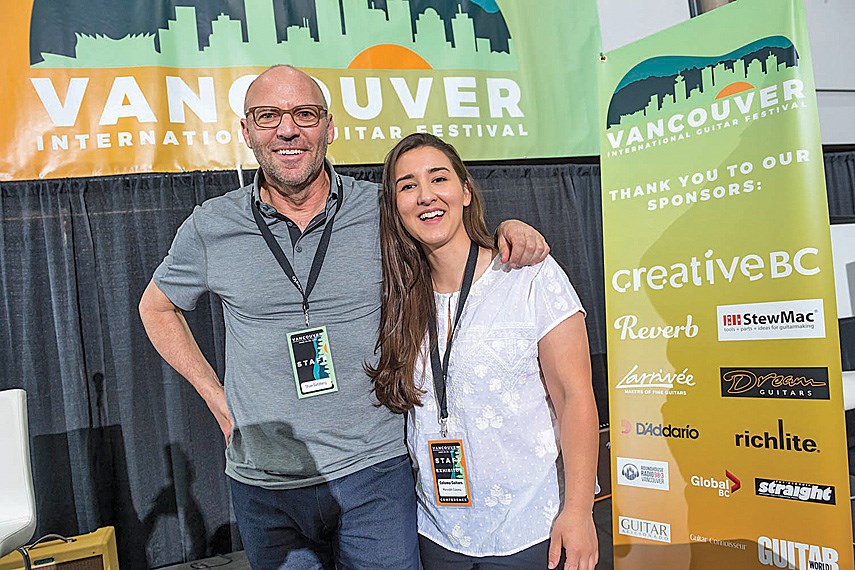Ordinarily, it’s tough to fire someone close to you – but not this time.
Shaw Saltzberg was a newly minted booking agent but, inexperienced as he was, he knew who to keep and who to release.
It was the early 1980s. Saltzberg was working with a small stable of singers who all showed promise except for one: Shaw Saltzberg.
For the previous two years Saltzberg had been singing pop songs and folk tunes in pubs, bars and restaurants all over B.C. But when Saltzberg started representing himself as an agent, he began to question his choice of clientele.
“My big turning point in my early career was when I had to drop myself from my own roster,” he recalls.
Nearly 40 years after sending that lonely guitar man down the road, Saltzberg laughs and re-imagines the final conversation.
“Hey man, you can’t cut it . . . We had a good relationship but it’s time for you to move on,” he imagines telling himself.
He first got the notion to lay down his guitar when his original agent, the one who wasn’t him, paid Saltzberg a compliment so backhanded Novak Djokovic could’ve turned it into a winner at Wimbledon.
“I think you’re really talented – maybe not in music,” his agent told him.
But rather than mounting a protest, Saltzberg found himself agreeing.
“I never believed in myself as a significant recording artist,” he acknowledges. What he did believe in, he says, was his talent for business.
He spent 33 years with The Feldman Agency, booking shows for artists including Michael Bublé, Diana Krall and Elvis Costello.
But three decades spent working as a middleman in the music industry’s ego sandwich could tax the patience of a mother or a saint. He’d “hit the wall,” he says.
“I’d done it a thousand different ways and wanted to move on.”
Initially, that meant spending a little more time on his hobby as a furniture maker.
“I guess my dream was to make acoustic guitars; which is like taking furniture building to the next step,” he says.
As a guitar maker, Saltzberg laughs when he describes himself as: “all tools, no talent.”
But he also notes the satisfaction of hand carving a guitar neck with your chord hand serving as the only relevant measurement.
As he researched guitar marking he came upon Meredith Coloma, a Vancouver luthier who’d been crafting guitars with exacting detail for nearly a decade.
She makes one of a kind acoustic and electric guitars, each one made almost entirely by hand.
They ended up getting in touch and Saltzberg asked Coloma the question he’d posed to countless musicians looking to jump from clubs to stadiums: “So, what are your ambitions?”
Coloma told him she wanted to open a school for luthiers. She wanted a bigger shop. She wanted attention paid to the demanding craft to which she’d devoted so much of her energy. She also wanted to find a business model that could support a guitar festival in Vancouver.
Like a boxer scenting a big money payday, the prospect of a guitar festival lured Saltzberg out of his retirement.
“I do those things,” he told her.
Coloma warned him her previous efforts at organizing had been dismissed.
“I said, ‘Well, you look 14 and you’re 26 and that’s the way it is,’” he remembers replying.
She wrangled the luthier community, he did planning and budgeting and together they produced a festival that packed Vancouver’s Chinese Cultural Centre with guitars, ukuleles, mandolins and about 400 guitars that ranged from simple acoustics to sculptures with strings.
Aside from moving the fest to Creekside Community rec centre overlooking False Creek, the 2018 fest is slated to feature far more live music including a performance from Harry Manx.
“I wanted people to have something to do after they checked out the beauty of the . . . handmade instruments,” Saltzberg says, explaining he wanted the event to be an experience as opposed to a show and sale.
The 2018 guitar fest also includes a wine and craft beer bar, a range of luthier classes, as well as an evening guitar pull in which a group of players each take turn playing guitar.
The guitar is portable, accessible, and a “participatory instrument,” Saltzberg says, discussing his love for the instrument.
“It does its best when you’re in a group setting where people can either jam together or sing,” he says. “If you love beautiful things, if you love artisanal culture . . . it doesn’t get much better than looking at these instruments.”
This year’s Vancouver International Guitar Festival runs Aug. 11-12.



